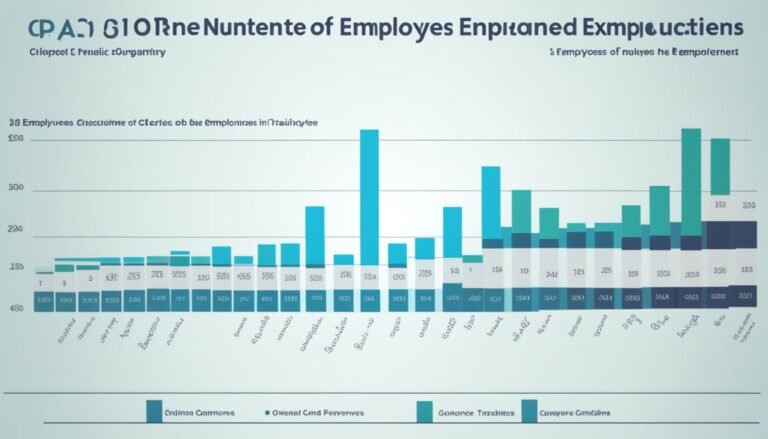A Guide to Human Resources Management Culture
Human resources management culture is key to the success of any organization. It refers to the set of values, beliefs, and behaviors that shape how a company manages its employees and creates a positive work environment. HR culture is strongly tied to organizational culture, as it directly impacts employee satisfaction, engagement, and overall performance.
Cultivating a strong HR culture involves various aspects, including developing company values and norms, implementing effective communication strategies, fostering employee development and well-being, and aligning HR practices with the organization’s goals.
This guide will delve into the importance of human resources management culture, its role in organizations, the responsibilities of HR professionals, and strategies to build and maintain a successful HR department.
Key Takeaways:
- Human resources management culture is crucial for organizational success
- It influences employee satisfaction, engagement, and overall performance
- Cultivating a strong HR culture involves aligning HR practices with company values
- Effective communication and employee development are essential components of HR culture
- Building and maintaining a successful HR department requires strategic planning
What is Human Resources?
Human resources is the department or group responsible for managing all aspects of employee-related matters within a company. This includes employee management, recruitment, employee benefits, company culture, and training. HR plays a critical role in supporting employees and helping the company achieve its goals. It is responsible for various tasks such as employee relations, creating an employment structure, managing job satisfaction, handling compensation and benefits, and maintaining a healthy work environment.
The Importance of Human Resources Management
Human resources management plays a crucial role in the success of any organization. A well-developed HR strategy can lead to numerous benefits, including improved employee relations, increased employee satisfaction and engagement, and the creation of a positive work environment. By effectively managing human resources, organizations can enhance their overall performance and achieve their goals.
A key aspect of HR management is talent management, which involves identifying, attracting, developing, and retaining top talent within the organization. This ensures that the right individuals are in the right roles and have the necessary skills and knowledge to contribute to the company’s success. Talent management is a strategic process that aligns with the business goals and values of the organization.
Employee satisfaction and engagement are critical factors in achieving organizational success. When employees are satisfied with their work, they are more likely to be productive, motivated, and committed to their roles. This ultimately leads to better performance and higher levels of customer satisfaction. HR management plays a pivotal role in creating a supportive and inclusive work environment that fosters employee satisfaction and engagement.
Furthermore, effective HR management contributes to the development of a strong organizational culture. A positive culture can attract and retain top talent, as well as enhance collaboration, innovation, and employee morale. HR professionals are responsible for developing and implementing strategies that promote a culture of inclusivity, professional growth, and continuous learning.
Overall, human resources management is essential for organizational success. By focusing on talent management, employee satisfaction, and the development of a positive culture, HR professionals can create an environment where employees thrive and contribute to the achievement of organizational goals.
Human Resources Responsibilities
Human resources (HR) plays a vital role in managing employees within an organization. HR professionals have a range of responsibilities that are essential for the smooth functioning of the company. These responsibilities include:
- Employee Relations: HR is responsible for handling employee relations to ensure a harmonious work environment. It involves addressing employee grievances, conflict resolution, and fostering positive relationships among team members.
- Employment Structure: HR creates and maintains an employment structure that aligns with the organization’s goals. This includes developing job descriptions, determining job roles, and establishing reporting structures.
- Job Satisfaction: HR plays a key role in managing employee job satisfaction. This involves conducting employee satisfaction surveys, identifying areas for improvement, and implementing strategies to enhance overall job satisfaction.
- Employee Benefits: HR manages employee benefits programs, such as health insurance, retirement plans, and leave policies. They ensure that employees are aware of their benefits and assist in resolving any issues related to benefits administration.
- Compensation: HR handles compensation management, which includes salary structuring, performance-based incentives, and rewards programs. They ensure that employees are fairly compensated for their contributions and maintain pay equity within the organization.
- Business Plan: HR contributes to the development and execution of the company’s business plan. They align HR strategies with organizational goals and objectives, ensuring that HR initiatives support the overall business strategy.
- New Hire Training: HR is responsible for providing comprehensive training programs to newly hired employees. This includes onboarding, orientation, and job-specific training to ensure that new hires are equipped with the necessary skills to succeed in their roles.
- Job Screening: HR conducts job screening and selection processes to identify qualified candidates for vacant positions. They review resumes, conduct interviews, and assess candidates’ qualifications and cultural fit within the organization.
- Company Culture: HR plays a critical role in shaping and maintaining the company’s culture. They develop and implement initiatives that promote a positive and inclusive work environment, fostering employee engagement and improving overall morale.
- Work Environment: HR focuses on creating a healthy and safe work environment for employees. They ensure compliance with labor laws and regulations, address workplace safety concerns, and implement policies and practices that promote work-life balance and employee well-being.
- Administrative Work: HR is responsible for various administrative tasks, such as maintaining employee records, processing payroll, managing employee data, and ensuring compliance with legal requirements.
By effectively managing these responsibilities, HR practitioners contribute to the overall success of the organization, fostering a positive work culture, and supporting employee growth and development.
How to Build an HR Department in 10 Steps
Building a successful HR department requires careful planning and execution. Follow these 10 crucial steps to establish an effective HR department:
- Create a company-wide staffing plan to determine the number and type of employees needed for each department.
- Set an HR budget that covers expenses such as recruitment, training, and employee benefits.
- Establish a payroll and administration system to accurately manage employee compensation and maintain necessary records.
- Write clear and comprehensive job descriptions for each position to attract qualified candidates.
- Create benefits plans that align with the needs and preferences of your employees, such as healthcare and retirement benefits.
- Develop an employee handbook that outlines company policies, procedures, and expectations.
- Set safety procedures and protocols to ensure a safe and healthy work environment for all employees.
- Collect and maintain administrative records, such as employee files and performance evaluations.
- Display necessary employment posters to communicate legal rights and protections to employees.
- Create performance and feedback processes to regularly assess employee performance, provide feedback, and foster professional growth.
By following these steps, you can build a strong HR department that effectively supports your organization’s needs and contributes to its overall success.
What is Human Resource Management (HRM)?
Human resource management (HRM) is the practice of managing all aspects of employees within an organization. It involves various tasks, including hiring, training, compensating, managing, and retaining employees. HRM is responsible for strategic planning, decision-making, and building and maintaining a team of employees. It is often referred to as personnel management.
HRM encompasses the entire employee lifecycle, from recruitment and onboarding to performance management and employee development. HR professionals play a critical role in ensuring that the organization hires the right talent, provides necessary training and support, and creates a positive work environment.
Effective HRM involves developing and implementing policies and processes that align with the organization’s goals. This includes managing employee compensation, benefits, and performance evaluations. HRM also involves handling employee relations, addressing workplace conflicts, and ensuring compliance with employment laws and regulations.
By focusing on HRM, organizations can optimize the potential of their workforce and create a culture of engagement and excellence. Effective HRM practices lead to improved employee performance, higher employee satisfaction, and lower turnover rates.
“The function of HR management is to help organizations achieve strategic objectives by attracting, developing, and retaining employees.” – Society for Human Resource Management (SHRM)
HRM is essential for organizational success as it ensures that the right people are in the right roles and provided with the necessary resources for their growth and development. It is a vital function that plays a significant role in shaping the overall culture and direction of an organization.
Through effective HRM practices, organizations can enhance employee productivity, foster collaboration, and drive innovation. By investing in HRM, companies can create a thriving work environment where employees feel valued, engaged, and motivated to contribute their best.
How Does Human Resource Management Work?
Human resource management goes beyond the responsibilities of the HR department alone. While HR professionals handle crucial tasks such as hiring, onboarding, managing employee benefits and compensation, and ensuring company policy compliance, team leaders and managers also play a significant role in HRM.
Team leaders and managers have their share of responsibilities that fall under the umbrella of HRM. These include:
- Employee Training and Development: Ensuring that employees have access to training programs that enhance their skills and knowledge, enabling them to perform their jobs effectively.
- Performance Management: Overseeing the performance of employees, setting goals, providing feedback, and conducting performance evaluations to drive individual and team success.
- Employee Engagement: Fostering a positive work environment, building strong relationships between team members, and implementing initiatives that boost employee motivation and satisfaction.
By involving team leaders and managers in HRM, organizations can create a collaborative and holistic approach to managing employees, promoting a culture of continuous learning, development, and engagement.
| HR Department Responsibilities | Team Leaders and Managers Responsibilities |
|---|---|
| Hiring | Employee Training and Development |
| Onboarding | Performance Management |
| Managing Employee Benefits and Compensation | Employee Engagement |
| Overseeing Company Policy |
The Objectives of Human Resource Management
Human Resource Management (HRM) plays a vital role in the success and growth of any organization. HRM focuses on various objectives to ensure the efficient functioning of the workforce and achieve organizational goals. Let’s explore the key objectives of HRM:
1. Fulfill Staffing Needs
One of the primary objectives of HRM is to attract and retain talented individuals who can contribute to the organization’s success. HRM is responsible for strategic workforce planning, recruitment, selection, and onboarding processes to ensure that the organization has the right people in the right roles.
2. Create and Maintain a Positive Work Environment
A positive work environment is crucial for employee satisfaction and productivity. HRM focuses on establishing policies, practices, and programs that promote a healthy and inclusive workplace culture. This includes fostering teamwork, promoting work-life balance, and addressing employee concerns through effective communication channels.
3. Optimize Organizational Behavior
HRM plays a crucial role in optimizing organizational behavior by aligning the employees’ actions with the organization’s values, mission, and goals. Through effective leadership development programs, performance management processes, and employee engagement initiatives, HRM nurtures a culture of high performance and continuous improvement.
4. Achieve Organizational Goals
The objectives of HRM are closely tied to the overall objectives of the organization. HRM works in partnership with other functional areas to develop and implement HR strategies that support the achievement of organizational goals. This includes talent management, succession planning, and performance management.
5. Implement Training and Development Programs
HRM recognizes the importance of continuous learning and development for both individual growth and organizational success. By identifying training needs, designing relevant programs, and providing opportunities for skill enhancement, HRM ensures that employees have the necessary knowledge and competencies to perform their jobs effectively.
6. Support Employee Empowerment
HRM aims to empower employees by promoting a participatory management style and providing opportunities for employee involvement in decision-making processes. Employee empowerment leads to higher job satisfaction, increased motivation, and improved overall performance.
7. Improve Employee Retention
Retaining talented employees is critical for organizational stability and growth. HRM focuses on implementing effective retention strategies such as career development programs, competitive compensation and benefits packages, and recognition programs to ensure employee loyalty and reduce turnover.
8. Ensure Compliance with Employment Laws and Regulations
Compliance with employment laws and regulations is essential to protect the rights of employees and maintain a fair and ethical work environment. HRM is responsible for staying up-to-date with legal requirements, implementing policies and practices that comply with labor laws, and handling any employee-related legal issues that may arise.
By working towards these objectives, HRM plays a crucial role in creating a positive work culture, developing a talented workforce, and driving organizational success.
HRM Career Opportunities and Requirements
Human resource management (HRM) offers a range of promising career opportunities for individuals interested in managing and supporting an organization’s most valuable asset – its employees. Whether you are just starting your career or looking to advance in the field, HR positions provide a variety of roles that cater to different skills and interests.
To pursue a career in HRM, most entry-level positions require a bachelor’s degree in human resources, business, or a related field. This foundational knowledge equips professionals with a solid understanding of HR principles and practices.
For those aiming for higher-level positions or a more strategic role in HRM, obtaining a Master of Business Administration (MBA) or a master’s degree can be advantageous. These advanced degrees provide a deeper understanding of business strategy, leadership, and organizational development.
In addition to formal education, obtaining professional certifications can enhance career prospects in HRM. The Society for Human Resource Management (SHRM) and the Human Resources Certification Institute (HRCI) offer globally recognized certifications such as the SHRM-CP, SHRM-SCP, PHR, and SPHR, which validate proficiency in HR knowledge and skills.
HRM Career Opportunities and Required Credentials
| HR Position | Required Education | Certifications |
|---|---|---|
| HR Coordinator | Bachelor’s Degree | SHRM-CP, PHR |
| HR Generalist | Bachelor’s Degree | SHRM-CP, PHR |
| HR Manager | Bachelor’s Degree | SHRM-CP, SHRM-SCP, PHR, SPHR |
| HR Director | Master’s Degree or MBA | SHRM-SCP, SPHR |
| HR Consultant | Bachelor’s Degree (varies) | SHRM-CP, SHRM-SCP, PHR, SPHR (optional) |
Obtaining the necessary education, certifications, and experience can open doors to a variety of HRM career paths. From entry-level roles such as HR Coordinator or HR Generalist to higher-level positions like HR Manager or HR Director, each role offers unique challenges and opportunities for growth.
Furthermore, HR professionals with advanced certifications and extensive experience may choose to venture into HR consulting, providing valuable guidance and expertise to organizations on a contract basis.
Skills and Responsibilities of an HR Manager
Being an HR manager requires a diverse set of skills and a deep understanding of various responsibilities. Let’s delve into the key competencies and tasks associated with this critical role.
HR Skills
- Degree in HR: HR managers typically hold a degree in human resources or a related field. This educational foundation provides a strong understanding of HR principles and practices.
- Experience in HR Systems: Proficiency in HR systems and metrics is essential for effective data management and strategic decision-making.
- Labor Law Knowledge: In-depth knowledge of labor laws is crucial to ensure compliance and protect the rights of employees and the organization.
- Excellent Communication skills: HR managers must possess strong written and verbal communication skills to effectively interact with employees, management, and external stakeholders.
- Interpersonal skills: Building relationships and resolving conflicts require exceptional interpersonal skills. HR managers must navigate sensitive situations with empathy and professionalism.
HR Responsibilities
- Talent Acquisition: HR managers oversee the recruitment and selection process to attract and retain top talent.
- Talent Management Alignment: They align talent management strategies with organizational objectives, ensuring skill development and succession planning.
- Workflow Management: HR managers manage the daily operations of the HR department, ensuring efficient processes and timely completion of tasks.
- Compensation and Benefits Analysis: They analyze compensation and benefits trends, ensuring competitive packages for employees while considering the organization’s financial priorities.
- Professional Development Coordination: HR managers coordinate professional development initiatives, including training programs, workshops, and conferences, to enhance employee skills and knowledge.
- Performance Reviews and Disciplinary Issues: They handle performance reviews, providing feedback, guidance, and support, and address disciplinary issues within the organization.
- Compliance with Labor Laws: HR managers ensure compliance with labor laws, keeping the organization up to date with changing regulations.
As an HR manager, embodying these skills and fulfilling these responsibilities is essential for effective people management and organizational success.
How to Become a Human Resources Manager
To pursue a career as an HR manager, there are several important steps you can take to enhance your qualifications and increase your chances of success. Here are some key factors to consider:
Earn a Bachelor’s Degree
Start by obtaining a bachelor’s degree in HR, business administration, or a related field. This educational foundation provides you with a solid understanding of HR principles, practices, and strategies. It also demonstrates your commitment to professional development and sets you apart from other candidates.
Gain Professional Experience
Building a successful career in HR management requires practical experience in HR roles. Seek opportunities to work in HR departments or intern with HR professionals to gain hands-on experience in recruitment, employee relations, and talent management. This exposure will broaden your knowledge and skills in the field.
Invest in Career Development
Continual learning and self-improvement are essential for career advancement in HR management. Consider pursuing advanced degrees such as an MBA or a master’s degree with a focus on HR. These credentials can deepen your expertise and open doors to higher-level positions.
Obtain HR Certifications
Professional certifications can enhance your credibility as an HR manager and demonstrate your commitment to industry standards. Seek certifications from renowned HR organizations like the Society for Human Resource Management (SHRM) or the Human Resources Certification Institute (HRCI). These certifications validate your knowledge and expertise in various HR domains.
Acquiring a bachelor’s degree, gaining professional experience, investing in career development, and obtaining HR certifications are crucial steps to becoming a successful HR manager.
By combining academic qualifications, practical experience, continuous learning, and certifications, you can position yourself as a competent and highly sought-after HR professional. Remember to stay updated with the latest industry trends, regulations, and best practices to add value to your organization and advance your HR management career.
| Steps to Becoming an HR Manager | Description |
|---|---|
| Earn a Bachelor’s Degree | Obtain a degree in HR, business administration, or a related field |
| Gain Professional Experience | Work in HR roles or intern with HR professionals to gain hands-on experience |
| Invest in Career Development | Pursue advanced degrees and continuous learning opportunities |
| Obtain HR Certifications | Acquire professional certifications from reputable HR organizations |
By following these steps, you can pave the way towards a successful career as an HR manager and make a meaningful impact on your organization’s human resources initiatives.
Conclusion
Human resource management culture plays a critical role in the success of an organization. By effectively managing employees, creating a positive work environment, and aligning with the organization’s goals and values, companies can achieve greater employee satisfaction and engagement. This, in turn, contributes to improved overall organizational success.
Building an effective HR department is essential for cultivating a strong HR culture and fostering a positive company culture. HR departments play a key role in various tasks, including employee relations, talent acquisition, compensation and benefits management, and training and development. By focusing on these areas, organizations can create an environment where employees feel valued, supported, and motivated to contribute their best.
Investing time and effort into developing a robust HR culture and company culture can yield significant benefits. It enables organizations to attract and retain top talent, enhance employee performance and productivity, and create a positive reputation in the market. Achieving organizational success requires a cohesive and collaborative approach that starts with a strong HR foundation and permeates throughout the entire organization.







